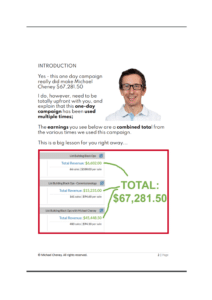Discover the power of referral marketing and learn how to make money online by leveraging social connections and word-of-mouth recommendations.

Introduction to the Power of Referral Marketing
Referral marketing stands as a beacon of opportunity for individuals seeking to bolster their online income through the power of social connections and personal recommendations. In the digital era, where trust plays a pivotal role in consumer decisions, referral marketing emerges as a potent strategy that leverages the credibility of word-of-mouth referrals from friends and family. The evolution of social media and digital platforms has further amplified the impact of referral marketing, making it more accessible and influential than ever before. Individuals can tap into this trend to not only earn passive income but also expand their network and cultivate trust with their audience.
For instance, Dropbox’s referral programme revolutionised user growth by offering additional storage space for each successful referral, thereby creating a win-win situation for both the referrer and the referee. This example showcases how a well-designed referral campaign can generate substantial results in terms of customer acquisition and brand recognition. By understanding the mechanics and benefits of referral marketing, individuals can unlock a plethora of opportunities to monetise their social capital and maximise their online earnings.
Moreover, referral marketing is not limited by industry boundaries, offering a diverse range of possibilities for individuals to explore. Companies like PayPal and Tesla have successfully implemented referral programmes that not only boosted user engagement but also fostered a sense of community and loyalty among participants. These success stories serve as testaments to the earning potential and impact of strategic referral marketing campaigns, motivating individuals to delve into this lucrative avenue for online income generation.
How Referral Marketing Works
Referral marketing operates on the premise of incentivising customers to refer others to a business by offering rewards such as discounts, prizes, or bonus products for successful referrals. This approach capitalises on the natural inclination of individuals to trust recommendations from people they know, thereby increasing the likelihood of conversions. For example, PayPal’s referral scheme, which rewarded both the referrer and the referee with monetary incentives, drove significant user acquisition and engagement for the platform. By creating a symbiotic relationship between the referrer, the referee, and the business, referral marketing fosters a sense of trust and mutual benefit that drives sustainable growth.
Furthermore, the method of sharing referral links, unique URLs, or codes provided by the business enables accurate tracking and attribution of successful referrals. This tracking mechanism allows businesses to measure the effectiveness of their referral programmes and reward participants accordingly. For instance, Dropbox’s referral programme’s success can be attributed to its seamless tracking system, which not only incentivised users to refer others but also facilitated the management of rewards for successful conversions. By understanding the operational aspects of referral marketing, individuals can streamline their referral efforts and optimise their earning potential.
Additionally, successful referral marketing campaigns often incorporate gamification elements to enhance user engagement and encourage more referrals. By introducing elements such as leaderboards, milestones, or rewards tiers, businesses can create a sense of competition and achievement among participants, driving higher levels of participation and enthusiasm. For example, Tesla’s referral programme, which offered prizes like free Supercharging for life or a chance to win a new Tesla car, sparked excitement and loyalty within the Tesla community, showcasing the power of gamified incentives in driving successful referral campaigns. Through a combination of incentives, tracking mechanisms, and gamification, individuals can elevate their referral marketing strategies and maximise their online earnings.
Benefits of Leveraging Referral Marketing
The advantages of leveraging referral marketing for online income generation extend beyond monetary gains to encompass broader benefits for individuals and businesses alike. One of the key benefits is the cost-effectiveness of acquiring new customers through referrals as compared to traditional marketing methods. By tapping into existing networks and relationships, businesses can reach potential customers who are more likely to convert due to the trust established through referrals, resulting in a higher return on investment.
Moreover, referral marketing contributes to building trust and credibility among potential customers, as recommendations from friends and family hold significant weight in purchase decisions. This trust factor not only facilitates the initial conversion but also lays the foundation for long-term customer loyalty and retention. For example, companies like Dropbox have leveraged the trust built through referrals to not only attract new users but also retain existing ones through added value and positive user experiences. By fostering a community of satisfied customers and brand advocates, businesses can create a sustainable revenue stream and solidify their market position.
Additionally, successful referral marketing programmes can lead to increased customer loyalty and retention rates, as individuals referred by someone they trust are more likely to have a positive initial experience with the brand. This positive experience lays the groundwork for repeat business and fosters a cycle of referrals, further expanding the customer base organically. For instance, PayPal’s referral scheme, which rewarded users for successful referrals, not only drove user engagement but also cultivated a sense of belonging and exclusivity within the platform’s community. By prioritising customer relationships and trust-building, businesses can harness the full potential of referral marketing to boost their online earnings and enhance brand loyalty.
Strategies for Implementing a Successful Referral Marketing Campaign
Implementing a successful referral marketing campaign requires a strategic approach that encompasses targeting the right audience, personalising incentives, and leveraging data analytics for optimal performance. Identifying and targeting high lifetime-value customers who are likely to make quality referrals is a crucial first step in maximising the impact of a referral programme. By focusing on customers with a strong potential to refer others, businesses can enhance the quality and relevance of their referrals, leading to higher conversion rates and customer acquisition.
Personalisation plays a significant role in the success of referral marketing campaigns, as tailoring incentives to match the preferences and behaviours of the target audience can increase the likelihood of successful referrals. For example, offering personalised discounts or rewards based on past purchases or interactions can create a sense of exclusivity and value for customers, motivating them to refer others. By aligning incentives with the audience’s interests and needs, businesses can foster deeper connections with their customers and drive more referrals.
Furthermore, utilising data analytics and tracking tools is essential for measuring the effectiveness of a referral marketing campaign and making data-driven decisions for optimal performance. By analysing key metrics such as conversion rates, engagement levels, and referral sources, businesses can gain valuable insights into the campaign’s impact and identify areas for improvement. For instance, companies like Dropbox and PayPal have leveraged data analytics to refine their referral programmes, resulting in increased user growth and engagement. By continuously monitoring and adapting their strategies based on data-driven insights, businesses can enhance the efficiency and success of their referral marketing initiatives, ultimately maximising their online earnings.
Examples of Successful Referral Marketing Campaigns
Successful referral marketing campaigns have played a pivotal role in driving the growth and success of various businesses across different industries. One notable example is Dropbox’s referral programme, which offered additional storage space for each successful referral, leading to rapid user growth and heightened brand awareness. This approach not only incentivised existing users to refer others but also created a viral effect that propelled Dropbox to the forefront of the cloud storage market. By rewarding users for their referrals, Dropbox not only expanded its user base but also strengthened its brand presence through positive word-of-mouth marketing.
In the financial sector, PayPal’s referral scheme stands out as a prime example of leveraging referral marketing to drive user acquisition and engagement. By offering monetary incentives for successful referrals to both the referrer and the referee, PayPal not only attracted new users but also fostered a sense of community and trust around its platform. This strategic approach not only boosted user numbers significantly but also solidified PayPal’s position as a trusted payment solution in the market. Through effective referral programmes, businesses can tap into the power of social connections and word-of-mouth recommendations to expand their customer base and enhance brand loyalty.
Moreover, Tesla’s innovative referral programme has set a benchmark for customer engagement and loyalty within the automotive industry. By rewarding referrers with prizes such as free Supercharging for life or the chance to win a new Tesla car, Tesla not only incentivised existing customers to refer others but also created a sense of excitement and exclusivity within its community. This unique approach not only generated buzz around the brand but also strengthened customer relationships and advocacy, showcasing the potential of referral marketing in fostering brand loyalty and driving business growth. Through strategic and creative referral campaigns, businesses can unlock new revenue streams and cultivate a loyal customer base that drives sustainable success.
 Maximising Earnings through Strategic Referral Marketing
Maximising Earnings through Strategic Referral Marketing
To maximise their earnings through referral marketing opportunities, individuals can explore various strategies and tactics to enhance the effectiveness of their campaigns. Engaging in cross-promotion activities with complementary businesses is a powerful way to expand the reach of referral campaigns and attract a wider audience. By partnering with businesses that share a similar target market but offer different products or services, individuals can tap into new networks and diversify their referral sources. For example, a fitness blogger could collaborate with a wellness brand to create a joint referral programme, offering incentives for referrals between the two businesses. This collaborative approach not only broadens the audience reach but also enriches the referral experience for customers, driving higher engagement and conversions.
Furthermore, implementing A/B testing can help individuals identify the most effective referral incentives and messaging strategies that resonate with their target audience. By testing different approaches such as reward structures, messaging styles, and call-to-action designs, individuals can gather valuable insights into what drives conversions and referrals. For instance, an e-commerce store could experiment with offering exclusive discounts versus free shipping as referral incentives to determine which approach yields better results. Through continuous testing and optimisation, individuals can refine their referral marketing strategies and maximise their online earnings.
In addition to A/B testing, leveraging social proof and testimonials from satisfied customers can bolster the credibility and trustworthiness of referral campaigns. By showcasing real-life success stories and testimonials from happy customers, individuals can build confidence and encourage more referrals from their audience. For example, featuring testimonials from customers who have benefited from the referral programme can instil trust and authenticity, making it more likely for others to participate. By harnessing the power of social proof, individuals can enhance the effectiveness of their referral marketing efforts and attract a higher volume of quality referrals, ultimately boosting their online earnings.
Differentiating Referral Marketing from Affiliate Marketing
Referral marketing and affiliate marketing are two distinct approaches to generating income online, each offering unique benefits and strategies for individuals and businesses. Referral marketing focuses on leveraging existing customer relationships to drive referrals and conversions, typically rewarding customers for successful conversions. This means that individuals who are already customers of a particular business are encouraged to refer friends, family, or acquaintances to the same company, creating a network of brand advocates. For example, Dropbox’s referral programme incentivised users with additional storage space for successful referrals, resulting in exponential user growth and brand visibility.
On the other hand, affiliate marketing involves collaborating with external entities such as influencers, bloggers, or content creators to promote products or services in exchange for a commission. Affiliates are typically compensated for driving traffic or sales to the business through their promotional efforts, creating a mutually beneficial partnership. For instance, companies like Fiverr and ShareASale have established successful affiliate programmes where individuals can earn cash, gift cards, or discounts for referring customers to the platform. By partnering with external influencers, businesses can tap into new audiences and expand their reach beyond existing customer networks.
While referral marketing targets the existing customer base to drive referrals and conversions, affiliate marketing focuses on building partnerships with external influencers to drive sales and expand promotional reach. By understanding the distinctions between these two approaches, individuals can tailor their strategies to align with their goals and target audience effectively. Whether leveraging existing relationships for referrals or collaborating with external partners for affiliate promotions, individuals can harness the power of both referral and affiliate marketing to maximise their online earnings and grow their revenue streams.
 Tips for Successfully Promoting Referral Links
Tips for Successfully Promoting Referral Links
Successfully promoting referral links requires a strategic approach that leverages compelling visuals, targeted marketing tactics, and incentivised rewards to engage the audience and drive conversions. Creating visually appealing referral banners or graphics can capture the attention of potential referrals and encourage them to click through to the desired link. By designing eye-catching visuals that highlight the benefits of the referral programme, individuals can pique the interest of their audience and increase the likelihood of conversions. For example, featuring vibrant graphics and clear call-to-action buttons can enhance the visibility and appeal of referral links, driving more clicks and referrals.
Incorporating email marketing campaigns into the promotion strategy can be an effective way to share referral links with existing customers and encourage them to refer their connections. Personalised email campaigns that highlight the value of the referral programme and offer exclusive incentives can resonate with recipients and prompt them to take action. By nurturing relationships with existing customers through targeted email communications, individuals can strengthen their referral network and increase their chances of successful conversions. For instance, sending personalised referral invitations to loyal customers with tailored incentives can drive engagement and referrals, ultimately boosting the individual’s online earnings.
Implementing a tiered reward system can incentivise referrers to actively promote products or services and drive more referrals. By offering additional incentives for multiple successful referrals, individuals can motivate referrers to continue sharing their referral links and expand their network. This tiered approach not only rewards referrers for their efforts but also encourages them to engage more actively in the referral programme, leading to a higher volume of quality referrals. For example, introducing rewards tiers based on the number of successful referrals can create a sense of progression and achievement for referrers, motivating them to reach higher levels and maximise their earning potential.
 Key Considerations for Selecting Profitable Referral Programs
Key Considerations for Selecting Profitable Referral Programs
When selecting profitable referral programs to participate in, individuals should consider factors such as the reputation of the company, the accessibility of the referral platform, and the terms and conditions of the programme. Evaluating the reputation and track record of the company offering the referral programme is essential to ensure credibility and reliability. By choosing reputable companies with a proven track record of successful referral programmes, individuals can mitigate risks and maximise their earning potential through legitimate and trustworthy opportunities.
Furthermore, the ease of use and accessibility of the referral platform play a crucial role in the overall user experience for both referrers and referees. A user-friendly interface that simplifies the referral process and provides clear instructions can enhance engagement and participation in the programme. Platforms like Wise and SoFi offer intuitive referral systems that make it easy for users to navigate, share links, and track referrals seamlessly, enhancing the overall referral experience for participants. By selecting programmes with user-friendly interfaces, individuals can streamline their referral activities and focus on driving conversions and earnings effectively.
Reviewing the terms and conditions of the referral programme carefully is paramount to avoid any potential misunderstandings or disputes regarding payout thresholds, reward structures, and referral tracking mechanisms. Understanding the rules and guidelines of the programme ensures that individuals are aware of the requirements and expectations for participation, thereby minimising the risk of miscommunication or dissatisfaction. For example, reviewing the payout thresholds and reward structures in advance can help individuals set realistic earning goals and track their progress towards achieving them. By familiarising themselves with the programme details, individuals can make informed decisions and maximise their earning potential through profitable referral opportunities.
Concluding Remarks on the Potential of Referral Marketing
In conclusion, referral marketing offers individuals a lucrative opportunity to earn passive income and monetise their social networks effectively. By harnessing the power of social connections and word-of-mouth recommendations, individuals can tap into a sustainable revenue stream through strategic referral marketing initiatives. The success stories of companies like Dropbox, PayPal, and Tesla highlight the vast potential of referral marketing in driving user growth, brand awareness, and customer loyalty. By implementing targeted strategies, leveraging data-driven insights, and fostering trust and credibility with their audience, individuals can maximise their online earnings and create a sustainable income source through referral marketing. Through continuous innovation, collaboration, and engagement, individuals can unlock new avenues for growth and success in the dynamic landscape of online referral marketing.

If you’ve been struggling online, this report will open your eyes.

Become the Internet Marketing Millionaire’s Next Apprentice!!

 Maximising Earnings through Strategic Referral Marketing
Maximising Earnings through Strategic Referral Marketing Tips for Successfully Promoting Referral Links
Tips for Successfully Promoting Referral Links Key Considerations for Selecting Profitable Referral Programs
Key Considerations for Selecting Profitable Referral Programs